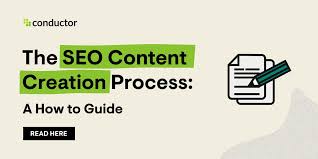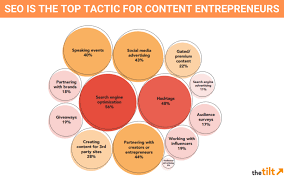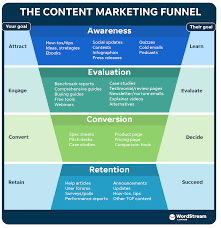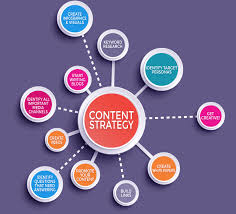Maximising Online Visibility: The Power of SEO and Content Creation
The Relationship Between SEO and Content Creation
Search Engine Optimization (SEO) and content creation are two essential components of any successful digital marketing strategy. While they are distinct practices, they are closely intertwined and work together to drive organic traffic to websites and improve online visibility.
SEO involves optimizing a website’s structure, content, and performance to rank higher in search engine results pages (SERPs). Keywords, meta tags, backlinks, and site speed are just a few of the many factors that influence a website’s SEO performance.
Content creation, on the other hand, focuses on producing high-quality, relevant content that engages users and provides value. This can include blog posts, articles, videos, infographics, and more. Compelling content not only attracts visitors but also encourages them to stay on the site longer and return for more.
When it comes to SEO and content creation, the key is synergy. High-quality content that is optimized for search engines can significantly improve a website’s visibility and attract more organic traffic. By incorporating relevant keywords naturally into the content and structuring it in a way that is easy for search engines to crawl and index, websites can improve their chances of ranking higher in SERPs.
Moreover, creating valuable content can also help attract backlinks from other reputable websites. Backlinks are an important ranking factor for search engines as they signal to algorithms that a website is trustworthy and authoritative. By producing informative and engaging content that others want to link to, websites can boost their SEO performance.
Ultimately, the relationship between SEO and content creation is symbiotic: one cannot thrive without the other. By combining effective SEO strategies with high-quality content creation efforts, businesses can enhance their online presence, attract more visitors, generate leads, and ultimately drive conversions.
In conclusion, investing in both SEO and content creation is crucial for businesses looking to succeed in the competitive digital landscape. By understanding how these two practices complement each other and working towards a harmonious integration of both into their digital marketing strategy, businesses can achieve long-term success online.
9 Key Advantages of SEO and Content Creation for Sustainable Online Growth
- Boosts website visibility in search engine results
- Drives organic traffic to the website
- Improves website’s online presence and brand awareness
- Enhances user experience with valuable and relevant content
- Increases engagement and time spent on the website
- Builds credibility and authority in the industry
- Generates leads and conversions through targeted content
- Helps establish thought leadership within the niche
- Provides long-term benefits for sustainable online growth
Challenges of SEO and Content Creation: Navigating Time, Competition, Algorithms, and Resources
Boosts website visibility in search engine results
One significant benefit of SEO and content creation is their ability to boost a website’s visibility in search engine results. By implementing effective SEO strategies and producing high-quality, keyword-optimised content, websites can improve their chances of ranking higher in search engine results pages (SERPs). This increased visibility not only drives more organic traffic to the website but also enhances brand awareness and credibility among online users searching for relevant information or products. Ultimately, by focusing on SEO and content creation, businesses can ensure that their website is easily discoverable by their target audience, leading to greater online exposure and potential business growth.
Drives organic traffic to the website
One significant benefit of SEO and content creation is their ability to drive organic traffic to a website. By strategically incorporating relevant keywords, optimizing meta tags, creating high-quality content, and building backlinks, businesses can improve their search engine rankings and attract more visitors without relying on paid advertising. This organic traffic not only brings in potential customers who are actively searching for products or information related to the business but also helps establish the website’s authority and credibility in the digital space. Overall, leveraging SEO and content creation to drive organic traffic can lead to sustainable growth and long-term success for businesses online.
Improves website’s online presence and brand awareness
By implementing SEO strategies and creating high-quality content, businesses can significantly enhance their website’s online presence and increase brand awareness. Optimizing website content for search engines helps improve visibility in search results, making it easier for potential customers to discover the brand. Additionally, producing valuable and engaging content establishes the brand as an authority in its industry, attracting more visitors and fostering trust and credibility. This proactive approach to SEO and content creation not only drives organic traffic to the website but also strengthens the brand’s online reputation, ultimately leading to increased recognition and awareness among target audiences.
Enhances user experience with valuable and relevant content
One significant benefit of SEO and content creation is their ability to enhance user experience by providing valuable and relevant content. When websites offer informative and engaging content that aligns with users’ search queries, it not only attracts visitors but also keeps them engaged and satisfied. By prioritizing quality content creation and optimising it for search engines, businesses can ensure that users find the information they are looking for easily, leading to a positive user experience that fosters trust, loyalty, and repeat visits.
Increases engagement and time spent on the website
One significant benefit of SEO and content creation is their ability to increase engagement and time spent on a website. By creating high-quality, relevant content that is optimized for search engines, businesses can attract visitors who are more likely to stay on the site longer, explore different pages, and engage with the content. This increased engagement not only enhances the user experience but also signals to search engines that the website is valuable and authoritative, potentially leading to improved rankings. Ultimately, by focusing on SEO and content creation to boost engagement, businesses can build stronger relationships with their audience and drive meaningful interactions that contribute to their online success.
Builds credibility and authority in the industry
One significant benefit of SEO and content creation is that they help build credibility and authority in the industry. By consistently producing high-quality, informative content that resonates with the target audience and is optimized for search engines, businesses can establish themselves as thought leaders in their field. This credibility not only enhances brand reputation but also instils trust among customers, leading to increased brand loyalty and a competitive edge in the market.
Generates leads and conversions through targeted content
One significant advantage of SEO and content creation is their ability to generate leads and conversions through targeted content. By creating high-quality, relevant content that is optimised for specific keywords and tailored to meet the needs of the target audience, businesses can attract qualified leads to their website. This targeted approach not only increases organic traffic but also enhances user engagement and encourages conversions. By strategically integrating SEO techniques with compelling content creation, businesses can effectively nurture leads through the sales funnel and drive valuable actions, ultimately boosting their ROI and achieving business growth.
Helps establish thought leadership within the niche
Establishing thought leadership within a niche is a significant benefit of combining SEO and content creation. By consistently producing high-quality, informative content that addresses industry trends, challenges, and innovations, businesses can position themselves as experts in their field. When this content is optimized for search engines, it not only attracts organic traffic but also enhances the brand’s credibility and authority. Thought leadership helps build trust with the audience and sets the business apart from competitors, ultimately leading to increased visibility, engagement, and opportunities for growth within the niche.
Provides long-term benefits for sustainable online growth
Search Engine Optimization (SEO) and content creation offer a significant advantage by providing long-term benefits for sustainable online growth. By implementing effective SEO strategies and creating high-quality, relevant content, businesses can establish a strong online presence that continues to attract organic traffic over time. This sustainable approach not only helps improve search engine rankings but also enhances brand visibility, credibility, and audience engagement in the long run. Investing in SEO and content creation sets the foundation for continuous growth and success in the dynamic digital landscape.
Time-consuming process
One significant con of SEO and content creation is the time-consuming nature of the process. Both practices demand considerable time and effort to conduct thorough keyword research, create engaging and high-quality content, and continuously monitor performance metrics. Crafting content that resonates with the target audience while incorporating relevant keywords strategically can be a time-intensive task. Additionally, monitoring the performance of SEO efforts and content effectiveness requires ongoing analysis and adjustments, further adding to the time commitment needed for successful implementation of these strategies.
High competition
In the realm of SEO and content creation, one significant drawback is the high level of competition that exists in the digital landscape. With an overwhelming amount of content being produced and published online every day, businesses face a daunting challenge in trying to differentiate themselves and secure top rankings in search engine results. The saturation of content makes it increasingly difficult to capture the attention of target audiences and stand out amidst the sea of information available, requiring businesses to adopt innovative strategies and high-quality content to overcome this obstacle.
Constant algorithm changes
One significant drawback of SEO and content creation is the constant algorithm changes implemented by search engines. These frequent updates often require businesses to continuously adjust their SEO strategies and content creation efforts to remain relevant and maintain visibility in search engine results. Keeping up with these changes can be time-consuming and challenging, as what works today may not necessarily work tomorrow. This con highlights the need for businesses to stay informed about algorithm updates and be agile in adapting their digital marketing tactics to ensure continued success in the ever-evolving online landscape.
Resource-intensive
One significant drawback of SEO and content creation is their resource-intensive nature. Achieving effective results in these areas often demands investments in specialised tools, expert knowledge, and dedicated resources, which can be financially burdensome for some businesses. The costs associated with implementing robust SEO strategies and producing high-quality content may pose challenges for smaller companies or those operating on limited budgets, making it difficult to compete with larger competitors who have greater financial resources at their disposal.







